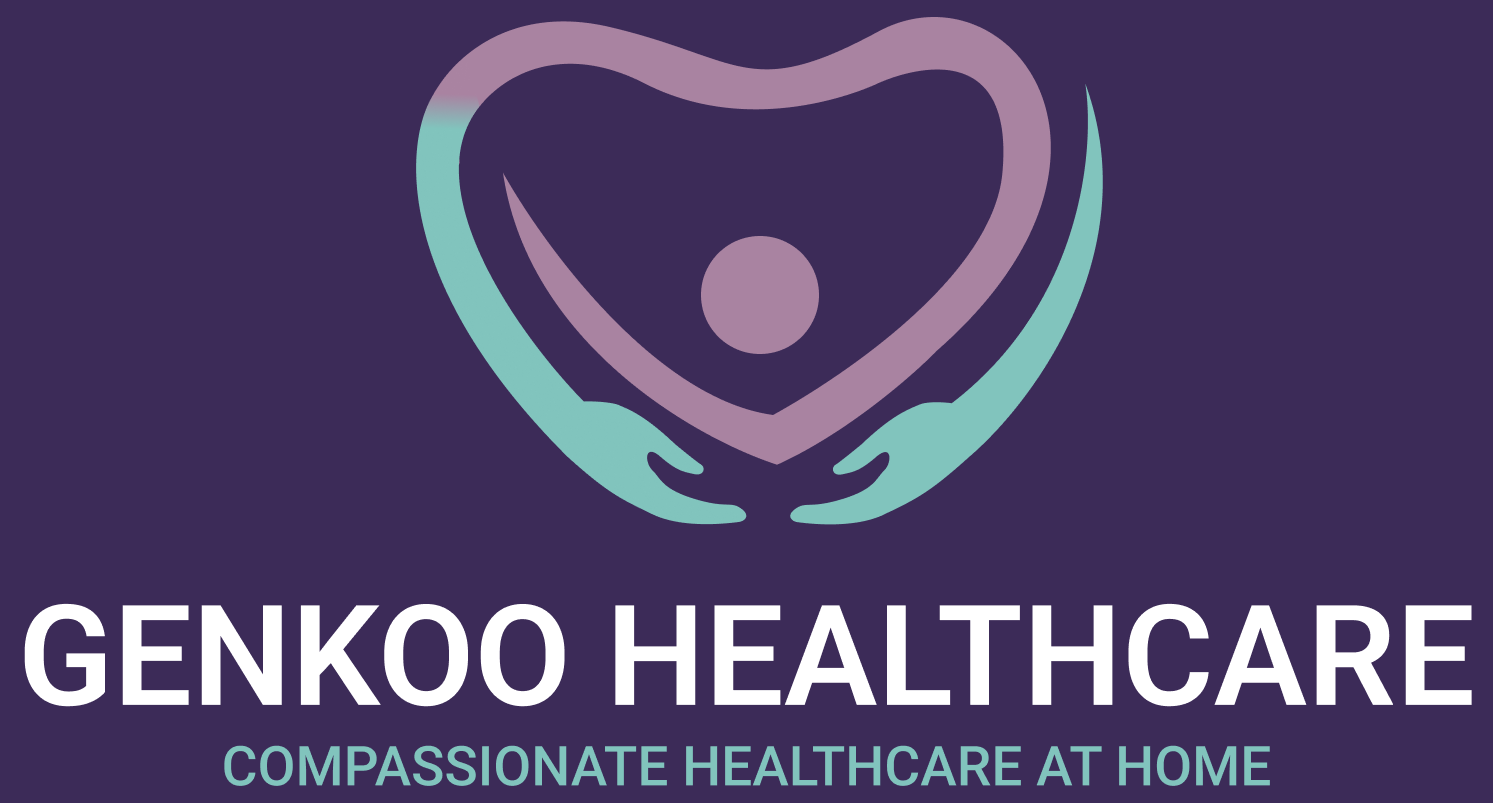
Spotting the Signs: A Comprehensive Guide to Recognising When Your Loved One Needs Home Care

Caring for ageing parents or loved ones with health challenges can be a deeply rewarding experience, but it can also be emotionally and physically demanding. As your loved one's needs evolve, it's essential to be vigilant and recognise the signs that might indicate they require additional support. At Genkoo Healthcare, we understand the complexities of this journey and are here to provide comprehensive guidance on recognising when home care might be the right solution for your loved one.
Understanding Home Care
Home care, also known as domiciliary care, is a range of services provided in the comfort and familiarity of your loved one's own home. It encompasses various support levels tailored to individual needs, from assistance with daily tasks and personal care to companionship and specialised medical care.
Key Indicators That Your Loved One Might Need Home Care
1. Difficulty with Activities of Daily Living (ADLs):
- Bathing and Grooming: Observe if your loved one struggles to get in and out of the shower or bath, wash their hair, brush their teeth, or shave.
- Dressing: Are they having difficulty putting on or taking off clothes, fastening buttons or zips, or tying shoelaces?
- Eating: Do they have trouble preparing meals, cutting food, or feeding themselves?
- Toileting: Are they experiencing incontinence or difficulty getting to and from the bathroom?
- Mobility: Watch for signs of unsteadiness, frequent falls, or difficulty walking, standing up, or transferring from a chair to a bed.
2. Changes in Physical Health
- Unexplained Weight Loss or Gain: Significant changes in weight without an apparent reason can indicate underlying health issues or difficulty with meal preparation and nutrition.
- Increased Fatigue or Weakness: Observe if your loved one is frequently tired, lacks energy, or struggles to complete tasks they once found easy.
- Changes in Vision or Hearing: Deteriorating eyesight or hearing can impact daily life, increasing the risk of accidents and social isolation.
- Chronic Pain: Unmanaged pain can significantly affect your loved one's quality of life and mobility.
- Worsening of Existing Conditions: If your loved one has a chronic illness, monitor for any decline in their condition or difficulty managing symptoms.
3. Changes in Cognitive Function
- Memory Loss: Notice if your loved one is forgetting appointments, conversations, or recent events.
- Confusion or Disorientation: Do they seem confused about their surroundings, the time of day, or their identity?
- Difficulty with Decision-Making: Are they struggling to make simple choices or manage their finances?
- Changes in Behaviour or Personality: Observe for uncharacteristic mood swings, withdrawal from social activities, or signs of agitation or anxiety.
4. Neglecting Personal Care or Household Chores
- Poor Hygiene: Pay attention to unkempt hair, body odour, or soiled clothing.
- Untidy Home: A cluttered or dirty living environment can indicate difficulty with household chores or self-care.
- Spoiled Food: Check the refrigerator for expired or mouldy food, which might suggest difficulty with meal planning or grocery shopping.
5. Social Isolation and Loneliness
- Withdrawal from Activities: If your loved one is no longer participating in hobbies or social events they once enjoyed, it could signify feelings of loneliness or depression.
Limited Social Interaction: Observe if they have fewer visitors or phone calls than usual.
Expressions of Sadness or Loneliness: Listen for direct statements or subtle cues that suggest they are feeling isolated or disconnected. - 6. Medication Management Challenges
- Missed Doses: Monitor if your loved one is forgetting to take their medications or taking them at the wrong times.
Difficulty with Medication Organisation: Notice if pill boxes are disorganised or if multiple medications are mixed up.
Side Effects or Adverse Reactions: Be aware of any unusual symptoms or changes in behaviour that could be related to medication interactions.
7. Safety Concerns
- Falls and Accidents: Frequent falls, burns, or other accidents can indicate a need for increased supervision and support.
- Wandering or Getting Lost: If your loved one has a tendency to wander or get lost, it could pose a serious safety risk.
- Unsafe Driving: Difficulty with vision, reaction time, or cognitive function can make driving unsafe for both your loved one and others on the road.
8. Recent Hospital Discharge or Change in Health Status
- Post-Hospital Recovery: Recovering from surgery, illness, or injury can be challenging, and home care can provide essential support during this transition.
- New Diagnosis: If your loved one has recently been diagnosed with a chronic illness or disability, home care can help them adjust to their new reality and manage their condition effectively.
Benefits of Home Care
If you recognise any of these signs in your loved one, it's crucial to explore the option of home care. Home care can offer numerous benefits, including:
- Personalised Care: Domiciliary care agencies can develop customised care plans that address your loved one's specific needs and preferences, ensuring they receive the appropriate level of support.
- Independence and Dignity: Home care enables your loved one to remain in the comfort and familiarity of their own home, promoting a sense of independence and control over their life.
- Improved Quality of Life: By assisting with daily tasks, personal care, and social interaction, home care can enhance your loved one's overall well-being and quality of life.
- Safety and Security: Home care can reduce the risk of falls, accidents, and medication errors, providing peace of mind for both your loved one and your family.
- Companionship and Emotional Support: Home carers can offer companionship and social interaction, reducing feelings of loneliness and isolation.
- Respite for Family Carers: Home care can provide much-needed breaks for family carers, allowing them to rest, recharge, and attend to their own needs.
- Cost-Effectiveness: In many cases, home care can be a more affordable option than assisted living or nursing home care.
Choosing the Right Home Care Provider
Selecting the right home care provider is essential to ensure your loved one receives the best possible care. When choosing a domiciliary care agency, consider the following factors:
- Reputation and Experience: Research the agency's reputation and experience in providing care for individuals with similar needs.
- Services Offered: Ensure the agency offers the specific services your loved one requires, such as personal care, medication management, companionship, or specialised medical care.
- Carer Qualifications and Training: Enquire about the qualifications and training of the carers who will be providing care for your loved one.
- Flexibility and Customisation: Choose an agency that can adapt to your loved one's changing needs and preferences.
- Communication and Transparency: Opt for an agency that maintains open communication with families and provides regular updates on your loved one's care.
- Cost and Insurance Coverage: Understand the agency's fee structure and explore any potential insurance coverage or financial assistance options.
Making the Decision
Deciding to bring in home care for your loved one can be a difficult but ultimately empowering choice. By recognising the signs, understanding the benefits, and choosing the right provider, you can ensure your loved one receives the compassionate and personalised care they need to thrive in the comfort of their own home.
At Genkoo Healthcare, we're committed to supporting you and your family throughout this journey. Our dedicated team of professionals is ready to answer your questions, provide guidance, and develop a tailored care plan that meets your loved one's unique needs. Contact us today to learn more about how we can help.
